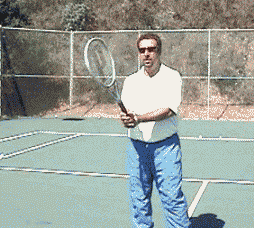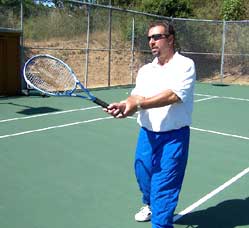The High Forehand Volley
Dan Miller
|
|
What should be one of the easier shots to execute is all too often framed or blasted into the back fence due to excessive backswings and follow-throughs. This tendency is even more evident when attempting to hit the volley on the move.
If this scenario sounds all too familiar; if you're one of those players who, when they see that high floater, tense up, foam at the mouth, and try to crush it into next week, well, I may have a solution.
Using the Non-dominant Hand
Use your non-dominant hand to gently grasp the wrist of the hand holding the racquet. Shadow a few imaginary volleys. Notice how the non-dominant hand prevents you from taking the racquet back too far and also limits the size of your follow-through.
|
|
 |
|
Placing your non-dominant hand on your wrist will help you get the feel for a more controlled backswing and follow-through. |
This short compact swing will result in better timing, a more solid follow-through, and quicker reaction for follow-up volleys.
The shorter more compact swing really does wonders especially when you are on the dead run and the ball is coming at you like laser.
Take it onto the Practice Court
Have your practice partner feed you easy balls from the service line until you get the hang of it. The next step is to bump the ball back and fourth between you and your partner (partner is still at the service line). Donít grip the racquet too tightly, if you do, you will not be able to control the ball as well.
Once you get things rolling form the service line, have your partner move back to the baseline and fire some harder balls at you. Keep repeating until you build up muscle memory. Next, try to execute the volley while on the move.
The key is to FEEL your new technique, to store it in muscle memory. Generate power by staying low and stepping into the ball, not by over swinging.
The final step to a better volley is to remove your non-dominant hand and try to repeat what you've learned. So, remember, a short backswing plus a short follow-through equals a more controlled and effective volley.
Your comments are welcome. Let us know what you think about Dan Miller's article by emailing us here at TennisONE.
To contact us, please email to: webmaster@tennisone.com
TennisONE is a registered trademark of TennisONE and SportsWeb ONE; Copyright 1995. All rights reserved.


